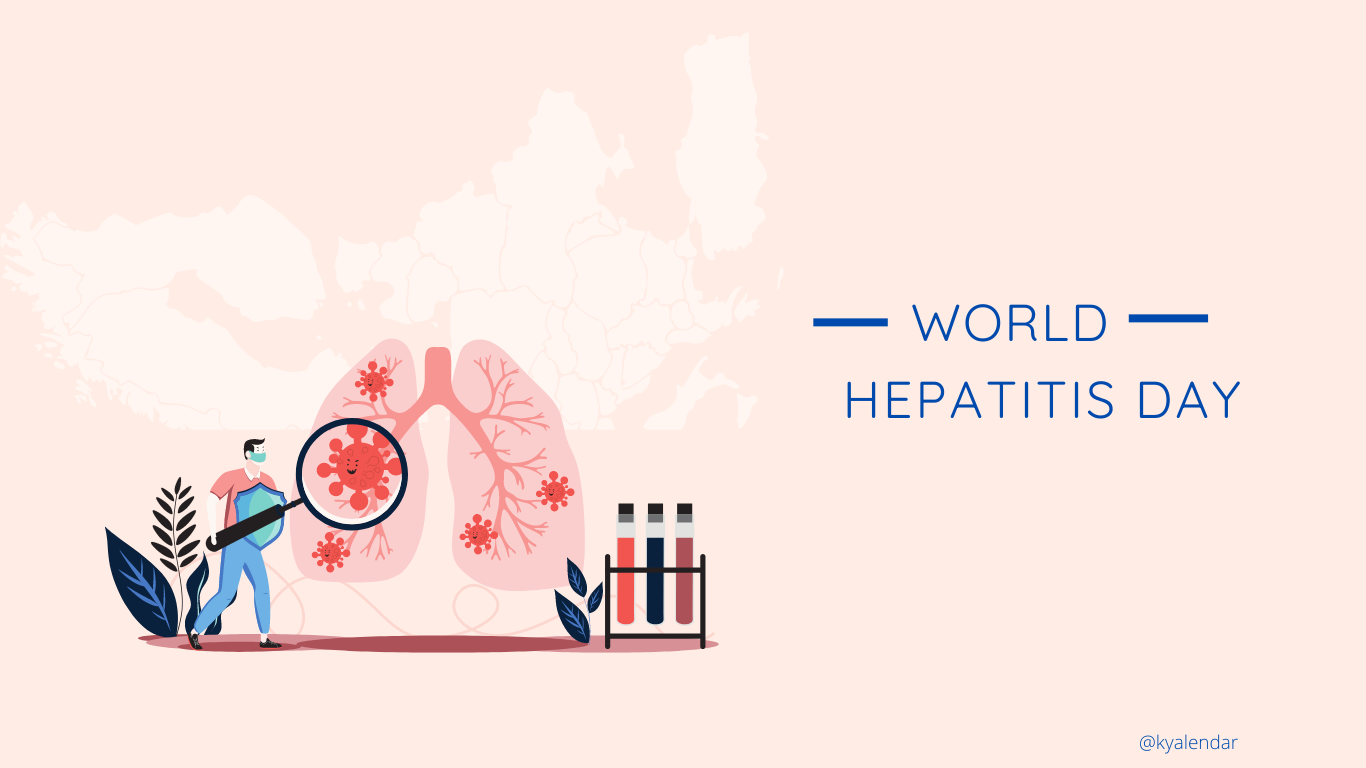
- This event has passed.
World Hepatitis Day
July 28

World Hepatitis Day is observed annually on July 28th to raise global awareness of hepatitis and encourage prevention, diagnosis, and treatment. The day is coordinated by the World Hepatitis Alliance in collaboration with the World Health Organization (WHO). The date was chosen in honor of the birthday of Nobel Prize-winning scientist Dr. Baruch Blumberg, who discovered the hepatitis B virus (HBV) and developed the first hepatitis B vaccine.
Purpose and Objectives
The main objectives of World Hepatitis Day are:
- Raise Awareness: Increase global understanding of hepatitis, its impact, and the measures needed to combat it.
- Promote Prevention: Highlight the importance of preventive measures, such as vaccination, safe blood transfusions, and harm reduction services.
- Encourage Testing and Treatment: Advocate for accessible testing and treatment options to reduce the burden of hepatitis.
- Eliminate Stigma: Reduce the stigma associated with hepatitis and support those living with the disease.
Key Themes and Focus
Each year, World Hepatitis Day focuses on a specific theme to address different aspects of the disease. Recent themes have included:
- 2023: “We’re Not Waiting” – Emphasizing the urgency in addressing hepatitis, particularly in the context of achieving global elimination goals by 2030.
- 2022: “Hepatitis Can’t Wait” – Highlighting the need for immediate action to prevent new infections and ensure treatment for those affected.
Types of Hepatitis
Hepatitis is an inflammation of the liver caused by different viruses, leading to a range of health problems and potentially life-threatening complications. The main types of viral hepatitis are:
- Hepatitis A (HAV): Typically spread through ingestion of contaminated food or water. A vaccine is available.
- Hepatitis B (HBV): Transmitted through contact with infectious body fluids, such as blood. Vaccination is a key preventive measure.
- Hepatitis C (HCV): Primarily spread through blood-to-blood contact. There is no vaccine, but effective treatments are available.
- Hepatitis D (HDV): Occurs only in those infected with HBV. Preventing HBV through vaccination also prevents HDV.
- Hepatitis E (HEV): Usually transmitted through contaminated water. There is a vaccine available, but it is not widely used.
Global Impact
Hepatitis affects hundreds of millions of people worldwide, causing acute and chronic liver disease and leading to significant morbidity and mortality. Key statistics include:
- Over 290 million people are living with viral hepatitis and are unaware of their condition.
- Hepatitis B and C cause around 1.1 million deaths per year, primarily from liver cirrhosis and liver cancer.
Activities and Celebrations
World Hepatitis Day is marked by various activities globally, such as:
- Public Awareness Campaigns: Media campaigns, social media initiatives, and public service announcements to disseminate information about hepatitis.
- Screening and Vaccination Drives: Free or subsidized hepatitis testing and vaccination services.
- Educational Programs: Workshops, seminars, and webinars to educate healthcare providers and the public about hepatitis prevention and management.
- Advocacy Efforts: Policy discussions and advocacy campaigns aimed at increasing political commitment and funding for hepatitis elimination programs.
Importance of the Day
World Hepatitis Day serves as a vital reminder of the ongoing battle against hepatitis and the need for global solidarity and action. It emphasizes:
- Preventive Measures: Importance of vaccination, safe practices, and harm reduction to prevent the spread of hepatitis.
- Accessible Healthcare: Ensuring everyone has access to testing, treatment, and care.
- Community Support: Supporting those affected by hepatitis and reducing stigma and discrimination.
Conclusion
World Hepatitis Day is a crucial global event that mobilizes stakeholders, raises awareness, and promotes actions to combat hepatitis. It underscores the need for comprehensive strategies to prevent, diagnose, and treat hepatitis and to support the goal of eliminating hepatitis as a public health threat by 2030.